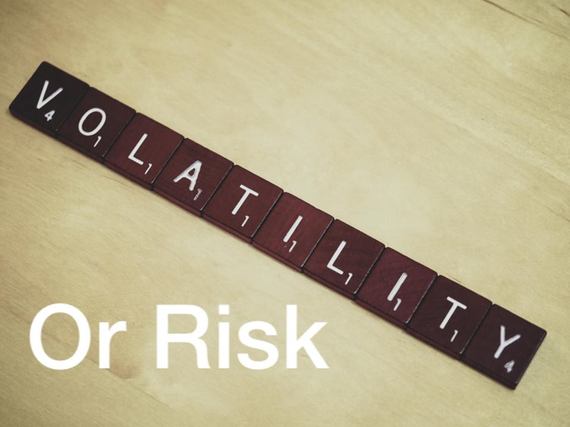When the stock market goes crazy, people go nuts. The ensuing insecurity has them thinking that stashing their money in a mattress at home is safer than investing it anywhere with anyone. But one should know the differences between risk and volatility to avoid silly and irrational investing mistakes. Let's clear the confusion once and for all.
By David Rae, CERTIFIED FINANCIAL PLANNER™
At any given social gathering, when I hear people saying things like "I just lost $5,000 in the market today" followed by "Even thinking about a financial plan stresses me out right now" I know it's just a matter of time before they conclude that investing is not for them. But what's really happening here is that these folks are thinking that risk and volatility are the same thing, when they most emphatically are not.
While risk and volatility are closely related, they're not by any means identical. It may seem like splitting hairs to make the distinction between the two but believe me, how well you understand the difference can make or break a sound financial plan . . . and your future.
This confusion between risk and volatility can also easily lead to rash financial decisions and mistakes that can cost you money in the short run and financial stability in the long one. So what are we looking at here?
By definition
•Risk is the probability or likelihood of losses relative to the expected return on any particular investment. For example, a risky stock is one that could pay out big but has a greater potential to be a loser. A risk is a chance (that may, in some cases for some investors, be worth taking).
•Volatility is just another way to say unpredictable fluctuation; in reality it shouldn't have any positive or negative connotation attached to it. It simply refers to the natural movement of the stock markets both up and down, and up and down again. For example, if a stock is particularly volatile that means it's value has moved around a lot, not necessarily going anywhere. It may just be going around like a Ferris wheel, up and down but always ending in the same place.
•Embracing volatility
Volatility is written into the DNA of the market. In fact, volatility is the market. The market may be up today, and down tomorrow or vice versa.
As a financial planner I'm here to tell you that volatility is par for the course when investing. Temporary declines can only be turned into permanent losses if you make some of the big investor mistakes. If you bail out of the market every time the market goes down even a tiny bit, you have no chance of ever reaching your long term financial goals, unless you are willing and able to save a huge portion of your income, and start at a young age. (Picture saving 30+ percent per year, and starting in your twenties.) Since I'm guessing you are not in your twenties anymore, and haven't been saving more than 30% of your income, you will probably need to deal with some volatility to reach your goals.
I keep seeing tons of headlines out there in the investment world all claiming to have the magic key to 'calm' or 'lower' volatility. They assert that suppressing volatility is in some way an important part of a financial plan, or that lower volatility means lowering the risks of a particular investment or portfolio of investments. IT DOESN'T.
I can totally understand why when given a choice you would choose less volatility over more volatility. This might be a smart choice if that were all that went into the discussion. But the ignored problem is reducing volatility may actually have serious negative consequences on overall long term investment returns. To put it more bluntly the more you attempt to suppress volatility the more likely you are to end up suppressing returns.
Negotiating risk
I hate to spill this little secret, but the biggest part of my job is help people avoid shooting themselves in the foot, sometimes repeatedly. Oftentimes taking too little risk ('taking chances' in civilian-speak) means you are limiting your opportunities of reaching your biggest and most important financial goals. For example, if you choose to save for retirement in a fixed account after inflation - just about as risk-free as you can get - you essentially have to save every penny out of your own pocket to fund what could easily be a 30 years retired. At the same time you are foregoing all the magic of compounding interest.
Real world scenario
In an efficient market, the more volatile an investment the greater the potential for a return. (This is confusing because the more risky an investment, the greater the potential for return too but bear with me here.) While the real world doesn't always work in exactly this way, it usually does.
Here's an example how volatility can work for you. If you are like many people and are putting money away into a 401(k) on a regular basis, volatility may allow you to make money on a specific investment over a period of time even if the investment itself doesn't actually even increase in value. This is called dollar cost averaging. Let's say for example you are buying Fund X which goes down the first 6 month of the year, then back up to even the next 6 months of the year. The fund ended the year breaking even, but since you were buying throughout the year, you may have ended up making money. This won't make you rich overnight, but it can help take advantage of volatility and reduce the overall risk of your portfolio. You essentially outperformed your own investments, always a nice thing.
Consequently, people looking to accumulate long term wealth should really be looking for big volatility in the market, and realize dips in the market are opportunities rather than risk.
Sanity rules
To the lay person, the risk-volatility dynamic is counterintuitive and can be pretty scary. I get that. And the greater the overall volatility of the market, the great larger propensity of investors left to their own devices to make emotional decisions that may cause them to underperform against their own investments, and the overall market as a whole.
But that's why it's good to know that you don't have to - and shouldn't - face this alone. That's why it's so valuable to have a good financial planner on your side. Certified Financial Planners and professional stock investors get paid for facing these fears because so many others are not equipped, nor experienced enough, to face them and put the volatility to work.
Furthermore, the best financial planners are more than just investment honchos. Giving real behavioral advice based on knowledge and experience is what the best of the best do on a daily basis. In addition to helping their clients keep their financial plans on track, they're also instrumental in helping their clients keeping their sanity intact.
"Be Fearful When Others Are Greedy and Greedy When Others Are Fearful"
― Warren Buffett
DAVID RAE, CFP®, AIF® is a Los Angeles-based retirement planning specialist with Trilogy Financial Services, a firm managing over $3 billion of client assets. He has been helping people reach their financial goals for over a decade. Follow him on Twitter @davidraecfp on Facebook or via his website, DavidRaeFP.com. david.rae@trilogyfs.com
Securities and advisory services offered through National Planning Corporation (NPC), Member FINRA, SIPC, a Registered Investment Advisor. Trilogy and NPC are separate and unrelated entities. The opinions voiced in this article are for general information only. They are not intended to provide specific advice or recommendations for any individual and do not constitute an endorsement by NPC. To determine which investments may be appropriate for you, consult with your financial professional. Please remember that investment decisions should be based on individual's goals, time horizon, and tolerance for risk. Investing involves risk including the potential for loss of principal. No investment strategy can guarantee a profit or protect against loss. Past performance does not guarantee future results. Dollar Cost Averaging does not assure a profit or protect against loss in declining markets. Such a plan involves continuous investments in securities regardless of fluctuating price levels of such securities and the investor should consider his/her financial ability to continue purchases through periods of low levels.


